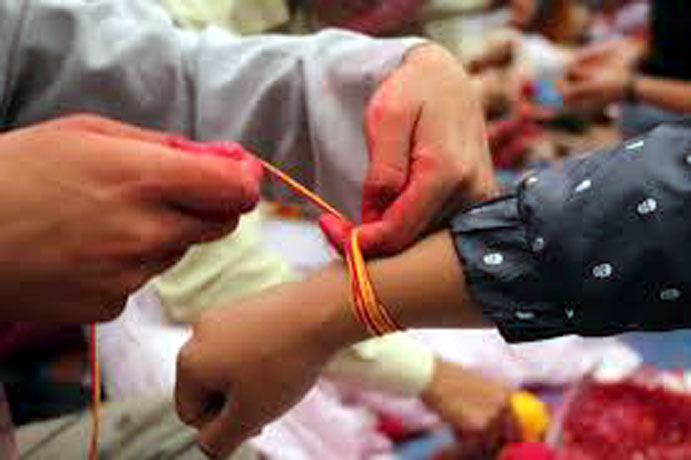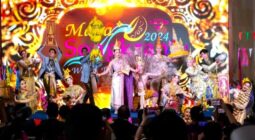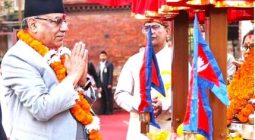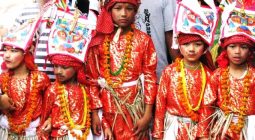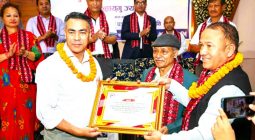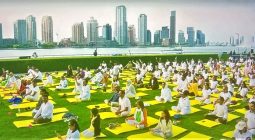The festival of ‘Janai Purnima’ or ‘Rishi Tarpani’ is being observed across the country (Nepal) today–3rd August. The festival is basically observed by the Hindus and Buddhists of the country.
It is also the day when Brahman priests go round the houses of their acquaintances and relatives and bind holy threads round their wrists as a protective against evils on this day.
In Terai, sisters ties “Rakhi” around wrists of their brothers wishing them long life and prosperity.
Thousands of devotees worship lord Shiva at Pashupatinath Temple and in Kumbheswor Temple in Patan take holy dips in ponds.

In Nepali home, a special dish called “Kwaati” made of nine kinds of cereals, beans and peas is prepared. Kwaati contains substances supplies of calories, making up the Vitamin deficiencies.
On this full moon day of Shrawan, all those Hindu males who have holy threads around their bodies bath in the Bagmati or Bishnumati or in Holy river and change their new holy thread for the old one.
According to the time-honoured tradition, Hindu people receive the ‘Raksha Bandhan’ thread, which is tied around the wrist as an amulet. The yellow thread is purified through the chanting of mantras by Brahmin priests as a symbol of protection from fear and disease.

In Newari language, it is also called Gunupoonhi or ‘Kwanti Puni.’ Kwanti, a soup prepared from nine different beans, is a special delicacy added to the Nepali menu today.
Today, thousands of devotees worship Lord Shiva at Pashupatinath in Kathmandu and at Kumbheswar in Lalitpur and other Shiva temples across the country and take holy dips in ponds and lakes and rivers.
However, the government has banned a crowd of more than 25 people in public places due to COVID-19 pandemic. The government has also asked the people to follow basic health standards.
Religious fairs are held at Gosainkunda, an alpine area in Rasuwa District. Pilgrims come from far-away places to take a holy dip in this lake and other lakes nearby and at Dansanghu Triveni in Jumla district to observe the festival with offerings of worship to Lord Shiva. Panchpokhari of Sindhupalchok; Janakpurdham, Dhanush Sagar and Ganga Sagar of Dhanusha and Trivenidham of Nawalparasi.
The Buddhists observe this day in commemoration of the day the Lord Gautam Buddha defeated the evil power of lust. This episode is well-described in the Buddhist scripture ‘Lalitbistar’. A special fair takes place today at Swayambhunath of Kathmandu on this occasion.
Nepal is the land of heady mixture of unique culture proudly preserved; mind boggling adventure and remarkable natural beauty. It is a land where foreigners can revitalize their mind, body and soul amidst scenery.
The peaceful coexistence of multi-religious system and beliefs is one of the most fascinating aspects of Nepal, where 70 ethnic groups with their own religious, cultures, languages and life-styles exists, is unique among the cultures of the world.
Nepal’s festivals are dynamic, enthralling. The influx of new sights and sounds are full of energy and life, and rich with genuine excitement.
Festivals are the lenses. In Nepal, every festival traditionally begins with something religious and moves with spontaneous spirit into a pleasant family feast. This is because, for Nepalese, religion has always influenced and has been the core of Nepali culture.
Festivals also offer foreigners a dramatic glimpse of Nepal’s people when they are at their happiest and most relaxed. Nepal’s wonderful cultural heritage is an invaluable resource, one which the Nepalese are striving to preserve.
No doubt, Nepal’s festivals rooted in the country’s history, mythology and religion, honour and propitiate the multitude of gods, control malicious spirits, or celebrate mythological victories over evil.
Nepalese festivals celebrate religious to historical aspect, agricultural to seasonal changes and legendary fun. Above all, a festival is a social occasion, and an affirmation of the ancient and strong bonds of religion and culture. The festivals of Nepal retain their authenticity, especially in the rural areas; they are not performances put on solely for tourist, but rather are the genuine expressions of vital cultures and religions.
The festivals and the ways of a country observe form the nation’s culture. Festivals in Nepal are reckoned not only as occasions to indulge in eating, drinking and making merry but also as occasions when one is to devote some of one’s time to the worship of and meditation upon gods and goddesses in different forms.
Foreigners used to say that “In Nepal, Every other building is a temple; every other day is a festival”.

